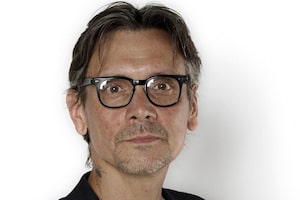When Claude Lanzmann's Shoah opened in late 1985, it came at the end of a year of giddy historical revisionism: Back to the Future and Rambo: First Blood Part II were high on the heap of box-office hits, and they appealed to something Lanzmann's monumental, nine-hour account of the Nazi extermination (just released on Criterion Blu-ray and DVD) of European Jewry strenuously denied.
This was a documentary that was not only about history but historical itself, and compelled us to look at the obscenity of the Holocaust as an unforgiving accrual of details. It permitted no stepping back into the safe havens of euphemism or big numbers. The factory of death was a matter of incidents.
Shoah has lost none of its power to chill in nearly 30 years. On the contrary, the full extent of its achievement – providing a revelatory testimonial to events that always run the risk of being reduced to manageable proportions – now seems clearer than ever. Inspired partly by his appalled reaction to the 1978 American miniseries Holocaust, which attained especially dubious blockbuster viewing status in Germany, Lanzmann's movie was determined to restore to the Holocaust its full, incomprehensible obscenity. For six million to die, it took an entire world to look the other way, and Shoah is nothing if not a long, unblinking gaze into the abyss.
Nearly a decade in the making, Shoah avoids all the comforting accepted wisdom of the Holocaust by treating it as a matter of mundane daily experience: the roles played by the people who lived near the death camps, the problems of keeping the machinery oiled and functioning, the sheer horrifying fact that people went on while the ovens belched smoke in the near distance.
It's a miraculous feat of endurance and focus: Lanzmann, a student of philosophy, close friend of Jean-Paul Sartre and former fighter in the French Resistance, spent years wandering from Israel to Poland to the United States to Germany, simply asking people the simplest questions: What colour were the vans in which people were gassed? Did you know the Jews who once owned the house you now live in? Do you think your world is better or worse for being rid of the dead?
Not light viewing, obviously, but riveting in its relentless determination to see the Holocaust literally from the ground on which it took place. A wily, fearless and inescapably manipulative interviewer – Lanzmann, now 87, may be well respected, but he is not universally liked – the filmmaker is a master at handing his subject just enough rope.
Among its many breathtaking moments is an interview among Polish Catholics in front of a church. In their midst is the last surviving Jew in their community, a man they all remember singing to the Germans as a boy, who smiles implacably as the discussion turns from cheerful affection to outright anti-Semitism.
At the time it was predictably criticized for its length, presumption of historical correction and the filmmaker's own perceived arrogance, but Shoah now feels like a work of rather staggering modesty and clarity – a movie that simply bears witness to the witnesses, and reminds us the only way of imagining the unimaginable is by breaking it down, brick by brick. There are almost no expert interviews in the movie (save for the late historian Raul Hilberg, who seems to speak for the entire film when he tells Lanzmann: "In all my work, I have never begun by asking the big questions, because I was always afraid I might come up with small answers") – its simple but audacious structure consists largely of interviews juxtaposed with those places where the horror once occurred.
It is, therefore, for all its accumulation of horrifying detail, a strangely austere, beautiful and simple work, about what can't be seen but must be witnessed. Empty roads where the gas vans once travelled, fields where ovens once functioned, railroad tracks covered in snow, an empty lot where a so-called castle of death once stood. It is this thundering silence that is Shoah's true subject, which Lanzmann himself calls "the presence of absence."
 Geoff Pevere
Geoff Pevere